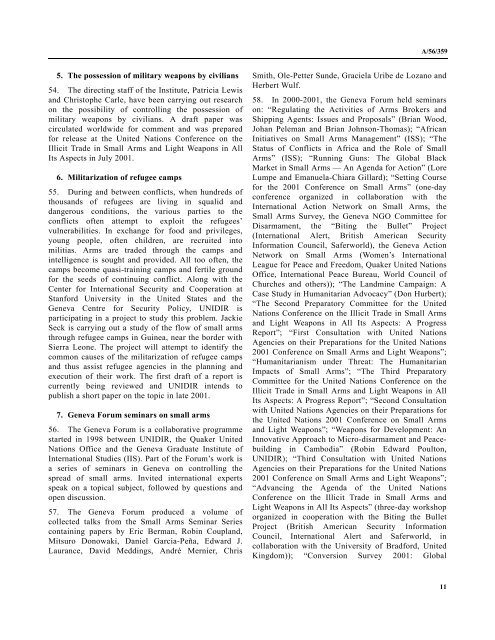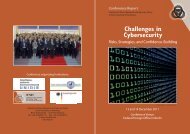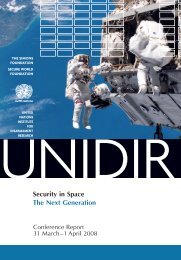General Assembly - UNIDIR
General Assembly - UNIDIR
General Assembly - UNIDIR
You also want an ePaper? Increase the reach of your titles
YUMPU automatically turns print PDFs into web optimized ePapers that Google loves.
A/56/359<br />
5. The possession of military weapons by civilians<br />
54. The directing staff of the Institute, Patricia Lewis<br />
and Christophe Carle, have been carrying out research<br />
on the possibility of controlling the possession of<br />
military weapons by civilians. A draft paper was<br />
circulated worldwide for comment and was prepared<br />
for release at the United Nations Conference on the<br />
Illicit Trade in Small Arms and Light Weapons in All<br />
Its Aspects in July 2001.<br />
6. Militarization of refugee camps<br />
55. During and between conflicts, when hundreds of<br />
thousands of refugees are living in squalid and<br />
dangerous conditions, the various parties to the<br />
conflicts often attempt to exploit the refugees’<br />
vulnerabilities. In exchange for food and privileges,<br />
young people, often children, are recruited into<br />
militias. Arms are traded through the camps and<br />
intelligence is sought and provided. All too often, the<br />
camps become quasi-training camps and fertile ground<br />
for the seeds of continuing conflict. Along with the<br />
Center for International Security and Cooperation at<br />
Stanford University in the United States and the<br />
Geneva Centre for Security Policy, <strong>UNIDIR</strong> is<br />
participating in a project to study this problem. Jackie<br />
Seck is carrying out a study of the flow of small arms<br />
through refugee camps in Guinea, near the border with<br />
Sierra Leone. The project will attempt to identify the<br />
common causes of the militarization of refugee camps<br />
and thus assist refugee agencies in the planning and<br />
execution of their work. The first draft of a report is<br />
currently being reviewed and <strong>UNIDIR</strong> intends to<br />
publish a short paper on the topic in late 2001.<br />
7. Geneva Forum seminars on small arms<br />
56. The Geneva Forum is a collaborative programme<br />
started in 1998 between <strong>UNIDIR</strong>, the Quaker United<br />
Nations Office and the Geneva Graduate Institute of<br />
International Studies (IIS). Part of the Forum’s work is<br />
a series of seminars in Geneva on controlling the<br />
spread of small arms. Invited international experts<br />
speak on a topical subject, followed by questions and<br />
open discussion.<br />
57. The Geneva Forum produced a volume of<br />
collected talks from the Small Arms Seminar Series<br />
containing papers by Eric Berman, Robin Coupland,<br />
Mitsuro Donowaki, Daniel Garcia-Peña, Edward J.<br />
Laurance, David Meddings, André Mernier, Chris<br />
Smith, Ole-Petter Sunde, Graciela Uribe de Lozano and<br />
Herbert Wulf.<br />
58. In 2000-2001, the Geneva Forum held seminars<br />
on: “Regulating the Activities of Arms Brokers and<br />
Shipping Agents: Issues and Proposals” (Brian Wood,<br />
Johan Peleman and Brian Johnson-Thomas); “African<br />
Initiatives on Small Arms Management” (ISS); “The<br />
Status of Conflicts in Africa and the Role of Small<br />
Arms” (ISS); “Running Guns: The Global Black<br />
Market in Small Arms — An Agenda for Action” (Lore<br />
Lumpe and Emanuela-Chiara Gillard); “Setting Course<br />
for the 2001 Conference on Small Arms” (one-day<br />
conference organized in collaboration with the<br />
International Action Network on Small Arms, the<br />
Small Arms Survey, the Geneva NGO Committee for<br />
Disarmament, the “Biting the Bullet” Project<br />
(International Alert, British American Security<br />
Information Council, Saferworld), the Geneva Action<br />
Network on Small Arms (Women’s International<br />
League for Peace and Freedom, Quaker United Nations<br />
Office, International Peace Bureau, World Council of<br />
Churches and others)); “The Landmine Campaign: A<br />
Case Study in Humanitarian Advocacy” (Don Hurbert);<br />
“The Second Preparatory Committee for the United<br />
Nations Conference on the Illicit Trade in Small Arms<br />
and Light Weapons in All Its Aspects: A Progress<br />
Report”; “First Consultation with United Nations<br />
Agencies on their Preparations for the United Nations<br />
2001 Conference on Small Arms and Light Weapons”;<br />
“Humanitarianism under Threat: The Humanitarian<br />
Impacts of Small Arms”; “The Third Preparatory<br />
Committee for the United Nations Conference on the<br />
Illicit Trade in Small Arms and Light Weapons in All<br />
Its Aspects: A Progress Report”; “Second Consultation<br />
with United Nations Agencies on their Preparations for<br />
the United Nations 2001 Conference on Small Arms<br />
and Light Weapons”; “Weapons for Development: An<br />
Innovative Approach to Micro-disarmament and Peacebuilding<br />
in Cambodia” (Robin Edward Poulton,<br />
<strong>UNIDIR</strong>); “Third Consultation with United Nations<br />
Agencies on their Preparations for the United Nations<br />
2001 Conference on Small Arms and Light Weapons”;<br />
“Advancing the Agenda of the United Nations<br />
Conference on the Illicit Trade in Small Arms and<br />
Light Weapons in All Its Aspects” (three-day workshop<br />
organized in cooperation with the Biting the Bullet<br />
Project (British American Security Information<br />
Council, International Alert and Saferworld, in<br />
collaboration with the University of Bradford, United<br />
Kingdom)); “Conversion Survey 2001: Global<br />
11








